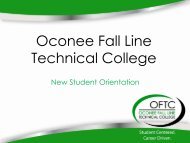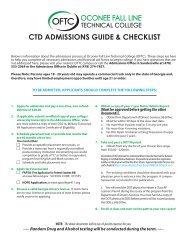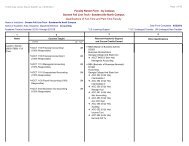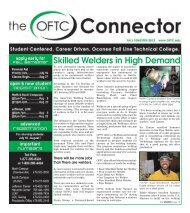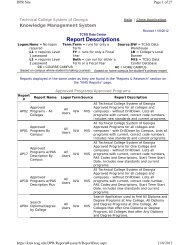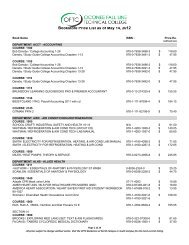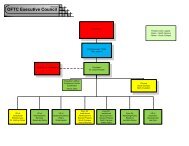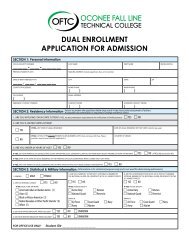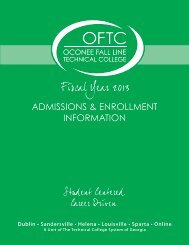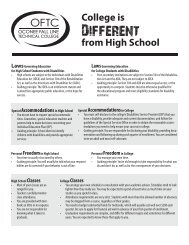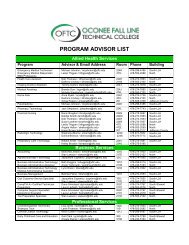OFTC - FY13 Handbook A Unit of the Technical College ... - OFTC.edu
OFTC - FY13 Handbook A Unit of the Technical College ... - OFTC.edu
OFTC - FY13 Handbook A Unit of the Technical College ... - OFTC.edu
Create successful ePaper yourself
Turn your PDF publications into a flip-book with our unique Google optimized e-Paper software.
<strong>OFTC</strong> - <strong>FY13</strong> <strong>Handbook</strong><br />
- 81 -<br />
• any hoax device, replica <strong>of</strong> a destructive device or<br />
configuration <strong>of</strong> explosive materials with <strong>the</strong> appearance <strong>of</strong> a<br />
destructive device, including, but not limited to, fake bombs,<br />
packages containing substances with <strong>the</strong> appearance <strong>of</strong><br />
chemical explosives or toxic materials.<br />
Personal Possession (Carrying) <strong>of</strong> a Weapon—<strong>the</strong> possession <strong>of</strong><br />
a valid firearms permit and/or a valid license to carry a concealed<br />
weapon does not permit any individual (e.g., staff, student, etc.)<br />
to carry a weapon on <strong>the</strong>ir person on <strong>the</strong> <strong>OFTC</strong> campus, satellite<br />
campus or o<strong>the</strong>r work site, or at any <strong>OFTC</strong> sanctioned event.<br />
Note: this prohibition does not extend to any person employed as<br />
a campus police <strong>of</strong>ficer or security <strong>of</strong>ficer and who is o<strong>the</strong>rwise<br />
authorized to carry a weapon pursuant to <strong>the</strong> provision <strong>of</strong> Chapter<br />
8 <strong>of</strong> Title 20, or those individuals currently employed, in or, as<br />
applicable, who are retired from <strong>the</strong> occupations referenced in<br />
O.C.G.A. 16-11-130.<br />
Vehicle in Transit—an individual over <strong>the</strong> age <strong>of</strong> 21 who holds a<br />
valid firearms permit or license to carry a concealed weapon may<br />
possess a weapon on <strong>the</strong>ir person in his/her vehicle or may keep<br />
a weapon in a locked compartment <strong>of</strong>, in a locked container in,<br />
or in a locked firearms rack in a motor vehicle when in transit on<br />
<strong>OFTC</strong> property.<br />
Parked Vehicle—<strong>the</strong> driver <strong>of</strong> a vehicle parked on <strong>the</strong> property<br />
<strong>of</strong> <strong>OFTC</strong> (including <strong>the</strong> personal vehicle <strong>of</strong> a student or <strong>OFTC</strong><br />
employee) may keep a firearm in his/her vehicle provided <strong>the</strong><br />
weapon is locked out <strong>of</strong> sight within <strong>the</strong> vehicle’s trunk, glove box,<br />
or o<strong>the</strong>r enclosed compartment or areas within <strong>the</strong> vehicle. Note:<br />
this provision applies to those drivers possessing a valid Georgia<br />
weapons carry license or who are o<strong>the</strong>rwise authorized by law to<br />
carry or possess a firearm/weapon.<br />
Any student or employee found in violation <strong>of</strong> this policy shall, in<br />
addition to any criminal action taken, be subject to dismissal or<br />
employment termination from <strong>OFTC</strong>.<br />
According to <strong>the</strong> Official Code <strong>of</strong> Georgia (O.C.G.A. 16-11-106),<br />
violation <strong>of</strong> this law can result in <strong>the</strong> following punishment:<br />
• A fine <strong>of</strong> not more than $10,000; imprisonment for not less<br />
than two, nor more than ten years, or both.<br />
• A juvenile who violates this shall be subject to <strong>the</strong> provision <strong>of</strong><br />
O.C.G.A. 15-11-37.<br />
Bloodborne/Airborne Pathogens<br />
Exposure Plan<br />
Oconee Fall Line <strong>Technical</strong> <strong>College</strong> maintains an approved<br />
Exposure Control Plan for occupational exposure to blood<br />
borne and airborne pathogens/tuberculosis. The plan is updated<br />
annually and posted in all <strong>OFTC</strong> libraries and in laboratories or<br />
classrooms, which are classified as Category I and II. A Category<br />
I program would include tasks/activities where <strong>the</strong>re is <strong>the</strong> definite<br />
potential for contact with blood, o<strong>the</strong>r potentially infectious body<br />
materials or airborne pathogens. A Category II program would<br />
include tasks/activities performed without exposure to blood or<br />
o<strong>the</strong>r body materials, or airborne pathogens to which universal<br />
precautions/standard precautions apply, but exposure might occur<br />
as an abnormal event or an emergency.<br />
The plan is designed to provide <strong>the</strong> faculty and students with<br />
recognition <strong>of</strong> tasks, proc<strong>edu</strong>res and activities which present<br />
<strong>the</strong> potential for occupational exposure to blood and air-borne<br />
pathogens and a means <strong>of</strong> eliminating or minimizing in <strong>the</strong><br />
performance <strong>of</strong> <strong>the</strong>ir instructional duties or activities. Training is<br />
provided to students by <strong>the</strong>ir respective faculty prior to performing<br />
student-student or student-patient/client proc<strong>edu</strong>res.<br />
Emergency Alerts<br />
The Emergency Preparedness Guide serves as a quick reference<br />
for <strong>OFTC</strong> employees, visitors and students by providing a timely<br />
response plan to prevent injury or damage to persons or property.<br />
The guide is posted on <strong>the</strong> <strong>OFTC</strong> website, in every room <strong>of</strong><br />
each building on each campus, for reference. Use this guide<br />
as a supplement for <strong>the</strong> purpose <strong>of</strong> quick notification for crisis<br />
response. In critical situations, dial 911 and speak to a public<br />
safety <strong>of</strong>ficial.<br />
In case <strong>of</strong> a serious accident or illness, 911 will be called for<br />
emergency care and <strong>the</strong> student’s emergency contact will be<br />
notified. The student or <strong>the</strong> student’s family will be responsible for<br />
<strong>the</strong> cost <strong>of</strong> such emergency care, including ambulance service.<br />
<strong>College</strong> personnel will not, as a college representative,<br />
provide personal transportation for injured or ill persons.<br />
Inclement Wea<strong>the</strong>r-Emergency<br />
Closing<br />
The conditions on all campuses and in surrounding areas are<br />
monitored very closely during inclement wea<strong>the</strong>r. If it becomes<br />
necessary to close or delay opening a campus during <strong>the</strong> day<br />
and/or evening, an announcement will be made via <strong>the</strong> <strong>OFTC</strong><br />
email system, when possible, and posted on <strong>the</strong> <strong>OFTC</strong> website.<br />
Typically, North and South campuses and <strong>the</strong> Instructional<br />
Centers will close due to inclement wea<strong>the</strong>r in response to <strong>the</strong><br />
area public school closings.<br />
<strong>OFTC</strong> closures or delayed openings will be announced by area<br />
television stations and local radio stations as follows:<br />
• WACO 100<br />
• WJBF<br />
• 13 WMAZ<br />
• WPEH<br />
• WJFL<br />
• NEWS 12<br />
• WKKZ<br />
• WQZY<br />
• WUFF<br />
• W35BB<br />
• WYSG<br />
• WVMG



